TUFS Celebrates 150th Anniversary
October 31, 2023
TUFS celebrated its 150th anniversary this year, and on Saturday, October 28th, 2023, a ceremony was held at the AGORA Global Prometheus Hall to commemorate the occasion.
Approximately 250 people attended the ceremony, including alumni, honorary professors, and retirees of the university, as well as educators and local government officials. President Kayoko Hayashi said, "Tokyo University of Foreign Studies exists to contribute to the coexistence between Japan and the world. We would like to continue walking the path towards this, as we pass the milestone of 150 years since our founding”. President Shojiro Nishio of Osaka University and President Saeko Terada of the Tokyo Gaigokai TUFS Alumni Association, gave congratulatory speeches. In addition, video messages were shown from people from 30 partner universities around the world.
The commemorative address was followed by a dialogue between journalists from TUFS: Ukrinform (Ukraine) News Agency Editor, Takashi Hirano (Graduated in 2004 from the Faculty of Foreign Studies, Russian Language Major), and NHK News Watch 9 Chief Reporter, Masayoshi Tanaka (Graduated in 1992 from the Faculty of Foreign Studies, Chinese Language Major). Vice President Toshihide Nakayama moderated the session while Mr. Hirano participated online from Kyiv, Ukraine. During the interview with Mr. Tanaka and Mr. Hirano, they talked about the invasion of Ukraine by the Russian army, including the impact on people's lives, the feelings of living in Ukraine from a Japanese perspective, how they face the world based on their experiences and how they have applied the spirit and knowledge gained through their studies at TUFS. Mr. Hirano said that his experience at TUFS helped him to understand the importance of listening to the real voices of people in the field, and Mr. Tanaka said that his knowledge of language and culture gained at TUFS has become a strength for him.
The ceremony also featured the university anthem sung by the student group Mixed Chorus Coeur Soleil and performances by the RAMS Cheerleading Team and the TUFS orchestra.
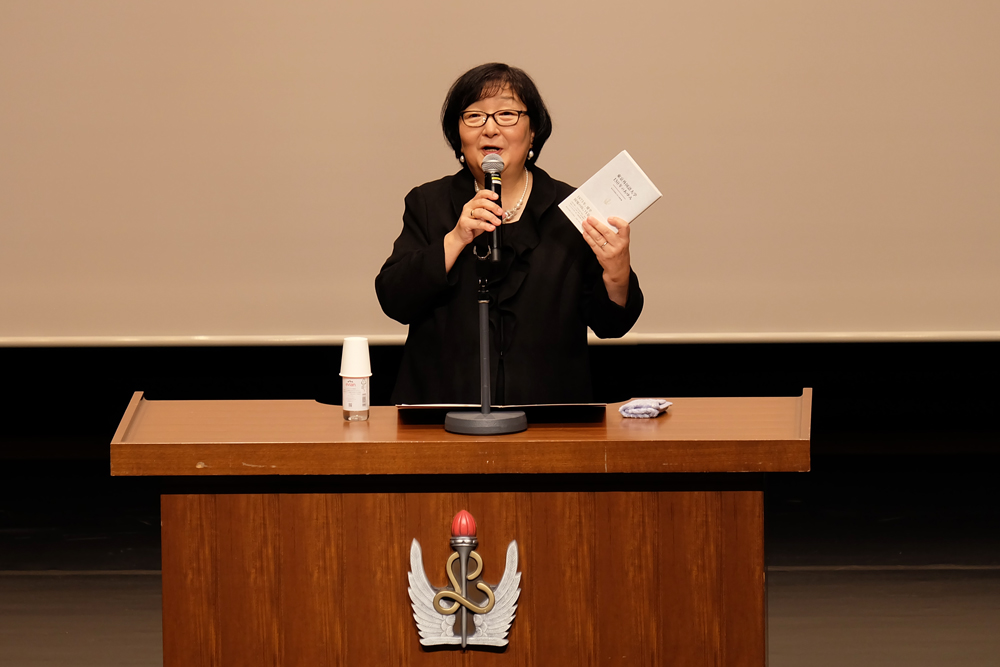
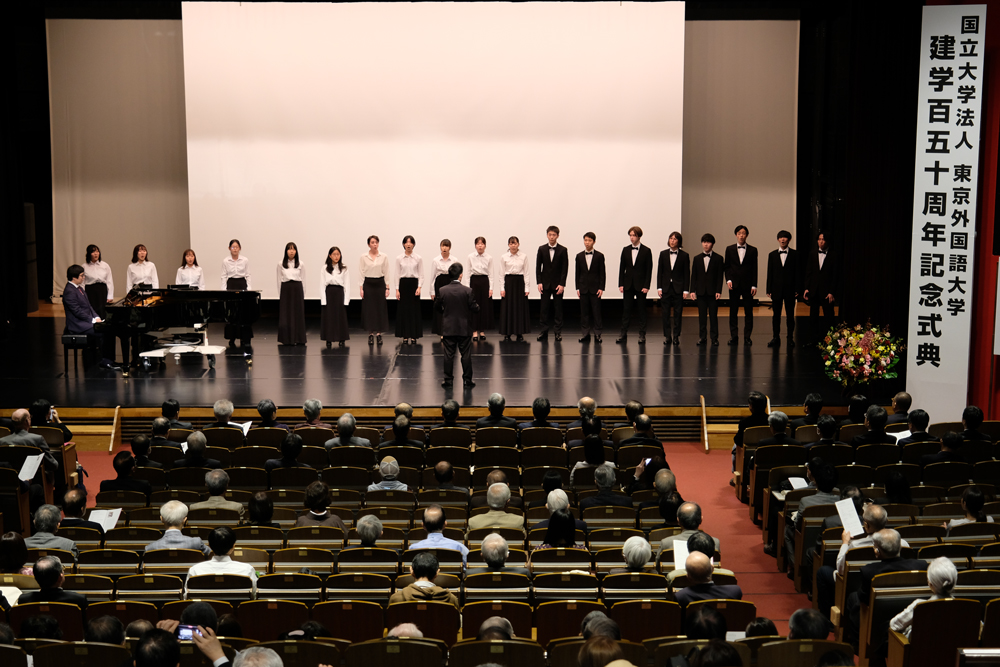
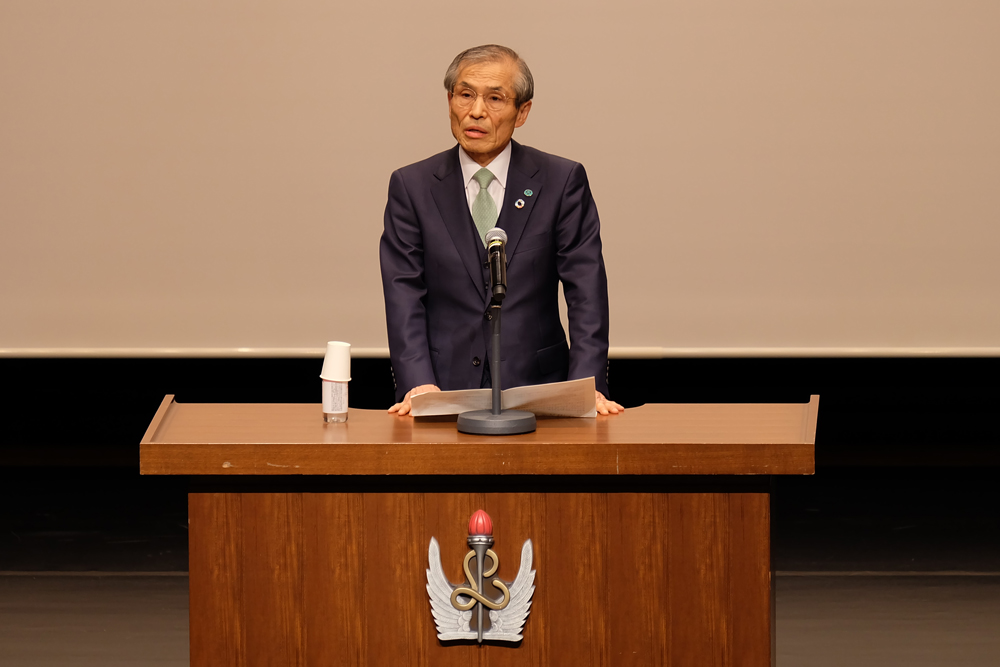
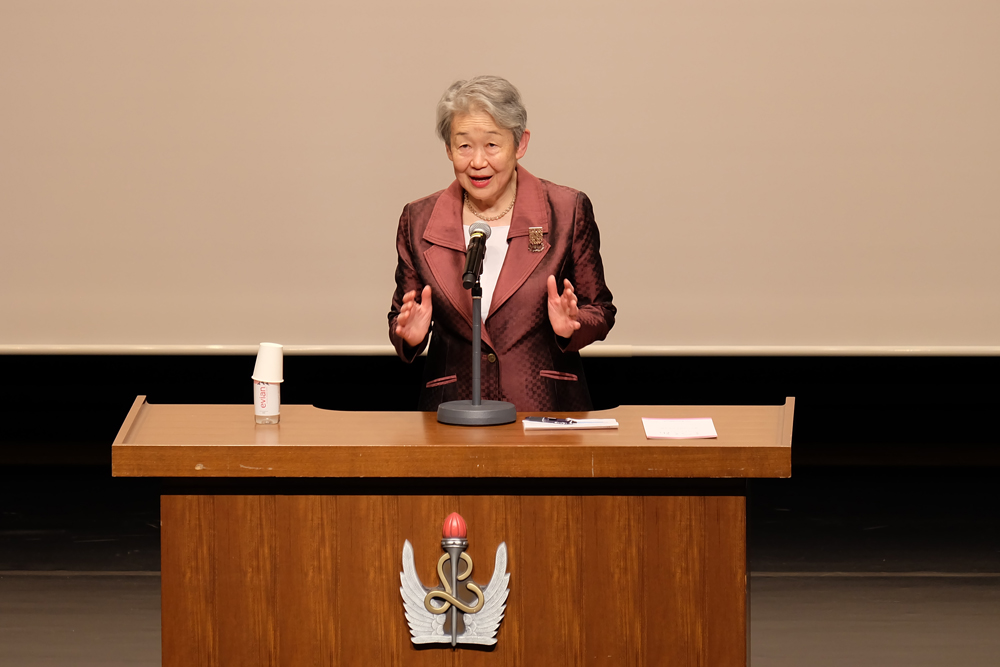
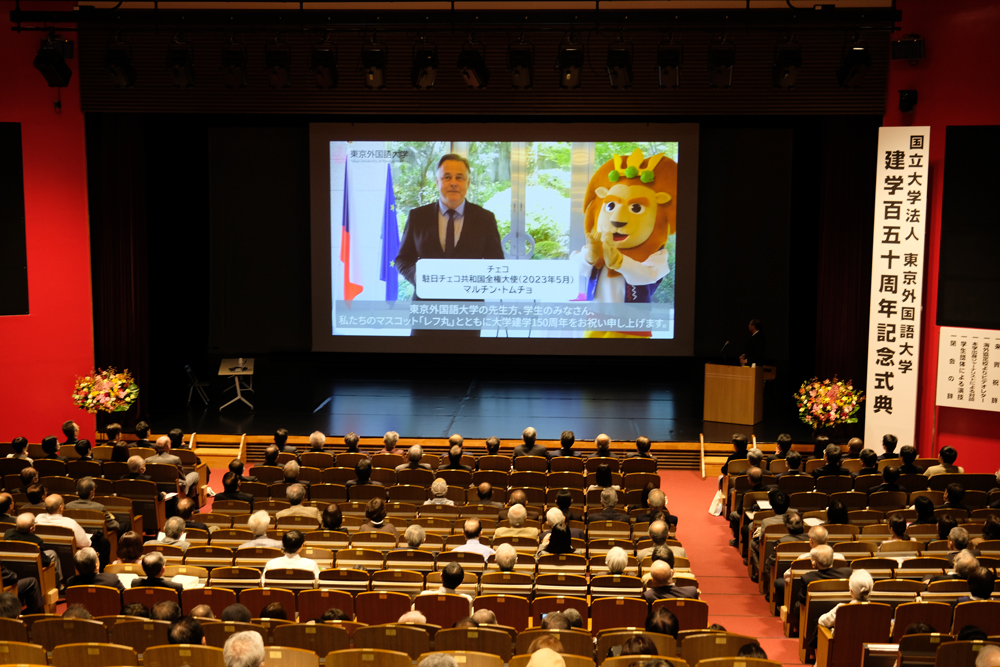
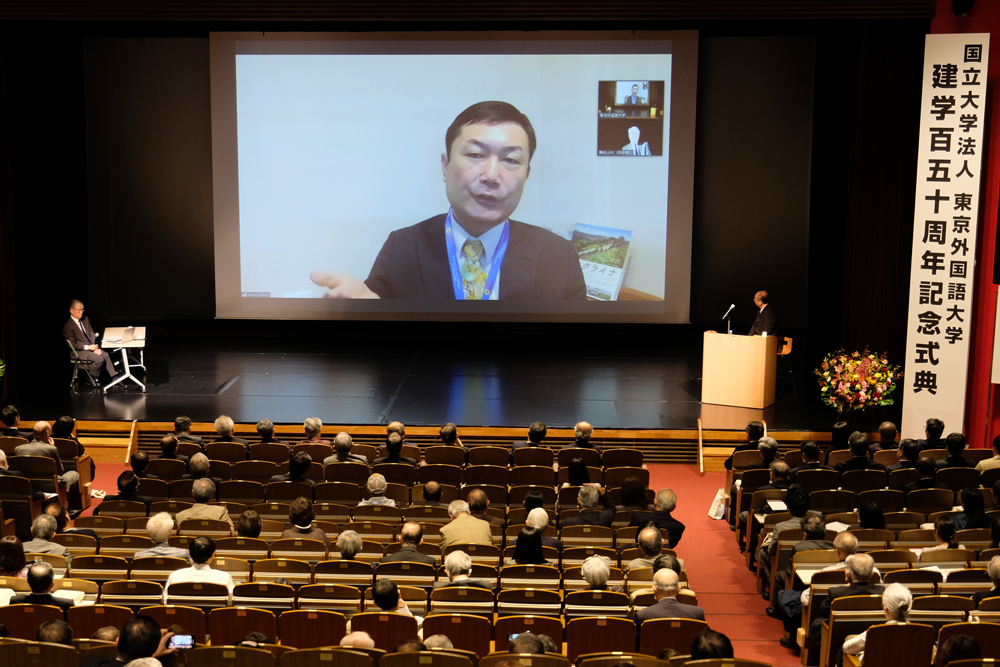
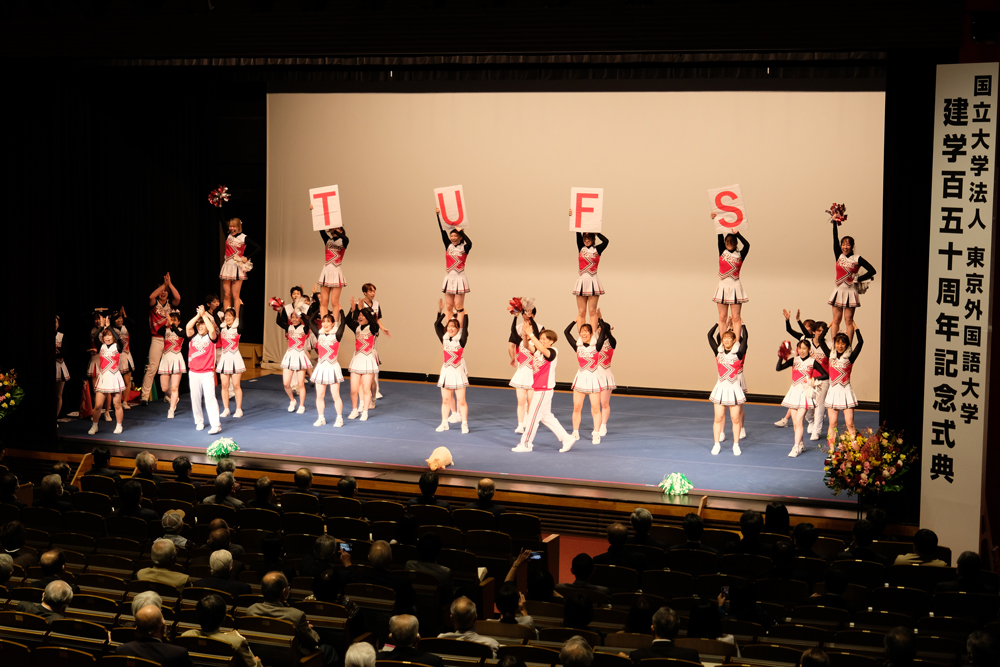
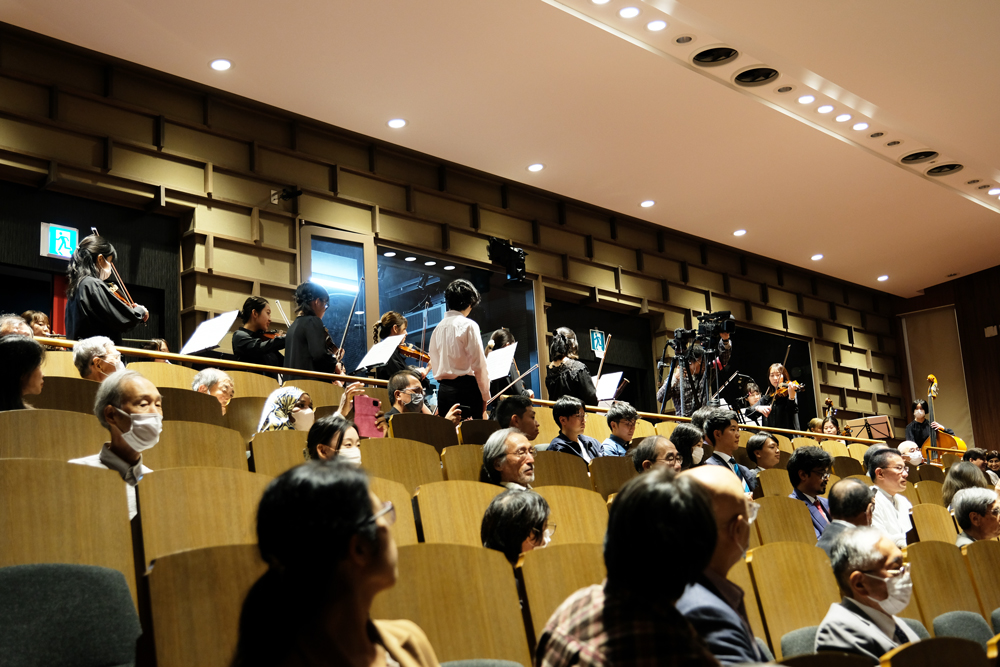
President's Address
It is my pleasure to welcome you to the Tokyo University of Foreign Studies 150th Anniversary Ceremony. On behalf of the university, I would like to express my sincere gratitude to everyone for taking time out of your busy schedules to attend today.
This year marks 150 years since our university was founded in 1873. As you may know, in recent years many places have been celebrating their 150th anniversary. This reflects the many new organizations and institutions that were created in the modernization of the Meiji Restoration, which are now reaching their 150th anniversary one after another. Looking at our university from the perspective of being one of these organizations or institutions, newly created about 150 years ago, I believe that the 150th anniversary of our university also marks the 150th anniversary of foreign language education in Japan, in other words, the beginnings of the acceptance of Western culture in our country.
Please refer to the publication “150 Years of Tokyo University of Foreign Studies”, edited by the TUFS Archives, for a more detailed history of our university, but allow me to briefly share the highlights with you now.
I will start with the origins of our university. The university is said to have its origins in the Bansho Shirabesho (Institute for the Research of Barbarian Documents) established at the end of the Edo period, but it was officially established as an educational institution in 1873, 150 years ago. It was created by merging a Ministry of Foreign Affairs language school with part of Kaisei School (which would later become University of Tokyo) to become Tokyo School of Foreign Languages. The purpose of the school was to train interpreters and provide language education for students entering advanced schools. It is said to have started with 236 students studying English, 96 studying German, 75 studying French, 32 studying Chinese, and 14 studying Russian.
After 12 years, in 1885, Tokyo School of Foreign Languages was merged with the Tokyo School of Commerce. The School of Foreign Languages was abolished the following year in 1886. It is said that Tatsunosuke Hasegawa, later known as the Russian literary scholar Shimei Futabatei, left the school in protest of this restructuring. However, 11 years after the school was closed, it was re-established in 1897 as an affiliation of the Tokyo High School of Commerce due to foreign relations such as the Sino-Japanese War. Two years later, the school separated from the Tokyo High School of Commerce and became independent as Tokyo School of Foreign Languages. After becoming independent, Tokyo School of Foreign Studies started teaching not only foreign languages, but also regional history, geography, literature, international law, economics, and pedagogy - thus forming the backbone of what is now Tokyo University of Foreign Studies. As you can see, the origin of our university was at the mercy of the transitions in the school systems in the early Meiji period. Throughout these past 150 years, we have maintained deep connections with the Tokyo School of Commerce, now known as Hitotsubashi University, including our close association as a partner member of the Union of Four Universities in Tokyo.
Since Tokyo School of Foreign Languages was established to learn about foreign matters, its history is deeply connected with the history of Japan’s expansion overseas. During the Russo-Japanese War, the increased demand for Russian interpreters led students to undergo intensive training during their summer vacation to graduate early, and it is said that more than 200 people served as military interpreters for the army and navy. In line with Japan’s expansion overseas, new language departments were established, such as Mongolian from Northeast China, Malay and Thai from Southeast Asia, and Hindi and Tamil from India. On the other hand, the Korean language department was abolished due to Japan’s annexation of Korea. A system for accepting students consigned to the army and navy was also established. It is also said that the education of the Portuguese language began as the number of Japanese immigrants to South America increased. As you can see, before the war, Tokyo School of Foreign Languages was directly influenced by government policies to which there was no choice but to respond. Despite this, many literary figures studied at Tokyo School of Foreign Languages, such as the aforementioned Russian literary scholar Shimei Futabatei and the poet Chuya Nakahara. It seems that the school had a culture that was about more than just practical studies. Many thinkers who opposed the government, such as Sakae Osugi, also graduated from Tokyo School of Foreign Languages.
However, the situation soon deteriorated. During World War II, a one-year intensive course on the languages of Southeast Asia was established, which shows that the school had little choice but to follow government policy as the war intensified. It is also known that over 200 people affiliated with the school, including conscripted students, were killed in the war.
Our university’s pre-war and wartime history is reflected in our philosophies of “seek peace” and “contribute to peace in the world and in Japan”. Our university was reborn as Tokyo University of Foreign Studies under the new post-war university system. Our post-war ideals of learning foreign languages, making friends around the world, and connecting Japan with the world, are in stark contrast to our pre-war university.
Like other national universities, Tokyo University of Foreign Studies is marking the 78th year of its foundation under the new university guidelines. From its inception until 2012, our university had only one school: the Faculty of Foreign Studies. We relocated the campus to Fuchu in 2000, so I believe that most of the alumni in attendance today probably attended the Nishigahara Campus in Kita Ward and graduated from the Faculty of Foreign Studies. Whenever I meet former students, many say that they didn’t study much during their time at university. I think it shows that proudly saying that 'I studied hard' must be slightly frowned upon in our old 'bankara' school culture of challenging each other to be independent, unconventional, and to value achievements over appearance. In fact, the career paths of our graduates who have made friends around the world have also expanded internationally. After graduating, many of you have gone on to play active roles around the world, supporting Japan’s post-war development and the following period of high economic growth.
Against this backdrop, the establishment of the Research Institute for Languages and Cultures of Asia and Africa at our university in 1964 was a major development in the humanities field in Japan. The background to this is that there was increased interest in Asia and Africa after the independence of Asian and African countries. In response to a proposal from the Science Council of Japan, the Research Institute for Languages and Cultures of Asia and Africa was established at our university, as the first joint research institute in the field of humanities, which lead to a dramatic leap forward in the research capabilities of Tokyo University of Foreign Studies.
Additionally, as part of post-war reparations, the Ministry of Education began accepting government-sponsored students from Asia, and our university was in charge of providing Japanese language education for these students. This project eventually branched into the Japanese language school under the Faculty of Foreign Studies, and the Japanese Language Center for International Students. Japanese language education is currently an important area of research and practice at our university.
The expansion of the languages and regions covered by the Faculty of Foreign Studies was related to the deepening of Japan’s international relationships. Starting with the Americas, Europe, and East Asia, the school eventually widened to include Southeast Asia, South Asia, the Middle East, Central Asia, Oceania, and Africa. Currently, we provide education in around 80 languages and regions, including 28 major languages. In 2012, the Faculty of Foreign Studies was reorganized into two schools: the School of Language and Culture Studies and the School of International and Area Studies. As a result, the impression that Tokyo University of Foreign Studies only teaches foreign languages has been dispelled, at least from the school names. In 2019, the School of Japan Studies was also established. Graduate education is developed as master's and doctoral programs in the Graduate School of Global Studies.
However, contrary to our university’s philosophies of making friends around the world and contributing to peace around the world and in Japan, the current international situation is painful to face. We are experiencing tremendous divisions in the process of one day bringing the world together. I fear that society may collapse first before we can become one. There are countless tensions around the world, such as in Myanmar, Ukraine, Sudan and Palestine.
However, the alumni and academics our university produces are not on the side of the governments of Israel or Palestine, rather they are the types of people who can look at the situation from the perspective of the Palestinian people living in Gaza, or who can have dialogs with the regular citizens living in Israel. These are people who can understand their logic because they know their language, culture, and historical background. We may not be able to solve these complex problems, but the staff and faculty of this university work every day to make our university a place that fosters people who can support others, empathize, and take action.
The need for empathetic people such as these is not limited to parts of the world in conflict. Even within Japan, we must coexist with people from diverse backgrounds, who use various foreign languages. We need a way for people with foreign roots to coexist in Japan while preserving their own languages and cultures, without forcing them to assimilate into Japan. Many of the human resources needed to make this happen have come from our university, and I believe that the students studying here today will be expected to play an increasingly active role in the future.
In short, I believe Tokyo University of Foreign Studies exists to contribute to the coexistence of people in Japan and the world. We would like to continue walking the path towards this, as we pass the milestone of 150 years since our founding.
Thank you again for attending this ceremony today. I would like to conclude by wishing you all good health and continued success.
